- You are here:
- Home »
- Blog »
- Gear Guide »
- Why Do Free Divers Use Snorkels?
Why Do Free Divers Use Snorkels?
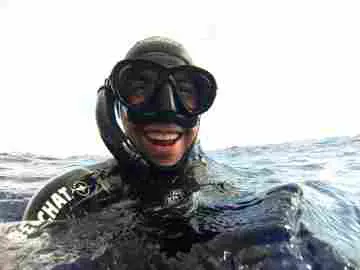
When I first saw freedivers in action, I never really understood why they were using snorkels.
After all, freediving is a sport where you venture into the deep unknown, far away from the surface and any available oxygen. When you’re 20, 60 or even 100 feet or more underwater, you’re too far away from the surface to inhale through a snorkel.
So then why do free divers use snorkels? Why bother if you spend most of your time deep underwater?
The main reason freedivers use snorkels is so they can breathe steadily and comfortably from the safety of the surface, while viewing underwater conditions. Such conditions include the marine life, the current, whether their diving buddies need help and so on. In other cases, some freedivers use snorkels to allow for a smoother breathe-up during wavey or rough water conditions.
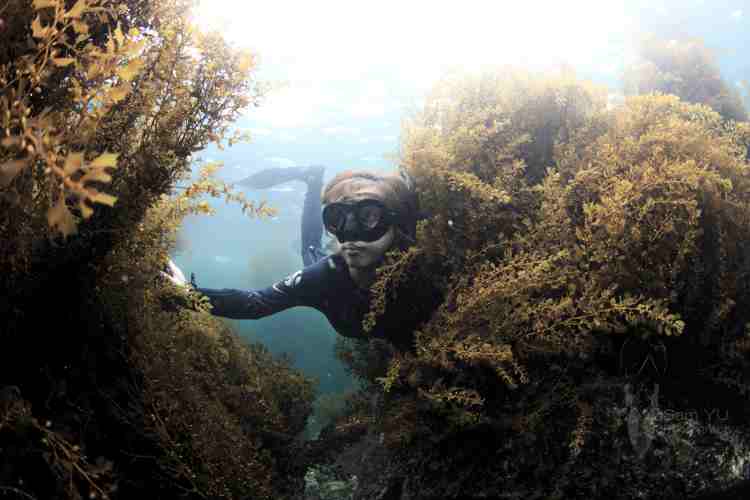
Snorkels are one of the few ‘essential’ pieces of freediving gear
What to look for in a freediving snorkel
For safety reasons, a snorkel is often said to be an essential piece of freediving gear.
The good news is that you don’t need a top-of-the-line snorkel. In fact, an expensive snorkel with all sorts of gadgets and safe-guards can actually hurt your freediving ability.
Instead, all you need is a simple, affordable J-tube-shaped snorkel. I recommend the Kraken Aquatics freediving snorkel. Click here to see it on Amazon.
Here’s what to look for in a J-tube freediving snorkel:
-
- A simple, basic model without any additional features: Forget about snorkels with ‘lock-out’ systems, dry air valves, purge valves etc. Why? Because all these unnecessary features add extra drag and resistance to slow you down when diving. Also, snorkels with all these features tend to be more expensive.
(Also a purge valve on your snorkels isn’t needed as a freediver, because the snorkel shouldn’t be kept in your mouth when diving anyway. More on this later)
-
- A bendable tube: The snorkel should be able to be bent inward when force is applied. The reason this is important is because you want your snorkel to bend when you descend or ascend. If your snorkel is too rigid, it will cause extra drag and resistance when you swim, slowing you down.
Also – rigid, inflexible snorkels tend to wobble when you dive due to all the water resistance. If you’re swimming fast enough and your snorkel isn’t flexible; the rigidness will cause the snorkel to smack you in the face while you dive – annoying and very distracting!
- A tube that’s soft against your head: It can become quite painful against the side of your head if your snorkel tube is incredibly hard. When in doubt, always pick the softer snorkel.
- A tube that isn’t too long: Typically, you won’t have to worry about the tube of a J-snorkel being too long as they are built to be short and simple. But in case you need to check; you’ll know your snorkel is the right length for you, if inhaling and exhaling seems almost effortless. It shouldn’t feel like breathing through a long straw! A short J-snorkel should also be easy to clear – usually only half a breath or so is needed.
- A snorkel-to-mask clip: Your snorkel should come with a clip so you can easily and comfortably attach it to your mask strap. If it doesn’t have a clip, you can try sliding the snorkel on the inside under your mask strap to hold it in place.
Click here to get the freediving snorkel that meets all the above requirements (which is why it’s so damn popular among freedivers!)
If you invest in the above Kraken snorkel – and you’re also wearing a good, low-volume freediving mask with powerful freediving fins…
You’ll jet through the water like a hydrodynamic torpedo. 😉
How to make sure your snorkel fits you
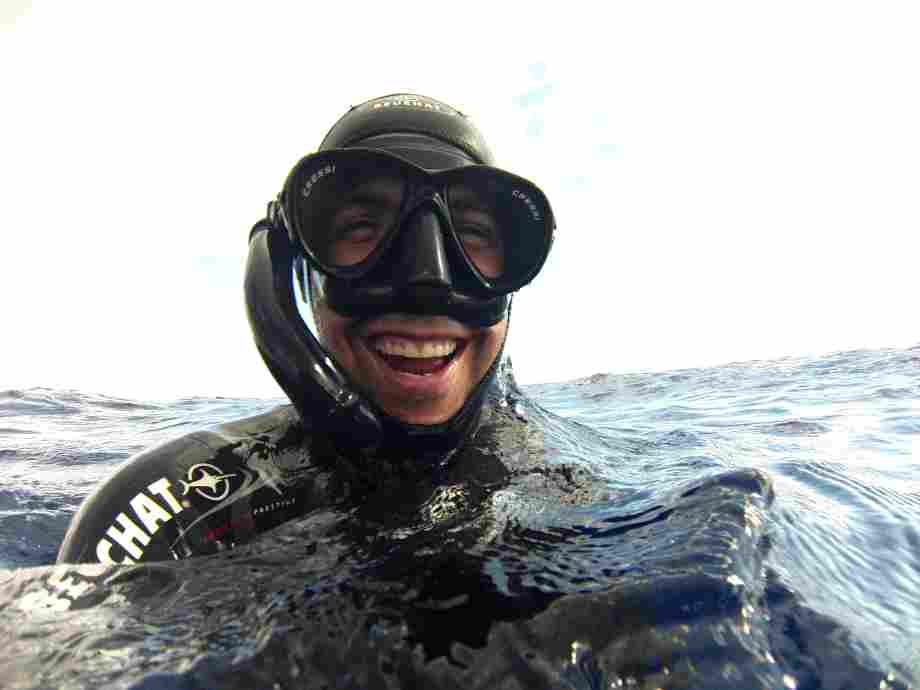
A good fitting snorkel should sit comfortably in your mouth, while still facing vertically into the sky
Finding a snorkel that fits comfortably in your mouth, yet comes out the water at the right angle can be a real challenge.
Below are some steps to follow for a comfortable snorkel fit:
-
- Start by putting on your mask: Ideally you’ll want to wet your mask first, to mimic real freediving conditions (but it’s not essential).
- Clip on your snorkel to your mask strap: Make sure the snorkel is at an angle where the mouthpiece lines up with your mouth. Now make sure the snorkel tube points up toward the sky. If the tube lines up at a funny angle (not upward), feels awkward or you don’t have a mask clip; simply slip your snorkel under the mask straps and re-adjust until it fits properly.
- Adjust your mouthpiece: Focus on making an air tight seal between your lips and the mouthpiece. When you breathe in and out through it, air should only be moving in and out from the top of the tube. You should also be able to comfortably slip your tongue in to block the mouthpiece and stop water getting in if needed.
Lastly, your mouthpiece should feel natural and comfortable. If it feels strange or like it’s forced into your mouth, try changing the angle of your snorkel. If that doesn’t work, you’ll have to try out another snorkel.
-
- Check how the snorkel tube feels against your face: The snorkel should feel soft and comfortable when clipped against your mask strap. It shouldn’t be noticeably uncomfortable or even painful against the side of your head. If it is, your snorkel tube is too hard or your mask straps are too tight.
Make sure your snorkel tube is a soft, fairly flexible material. If it’s too hard, it’s incredibly annoying as it will wobble against your face when diving and scare off fish.
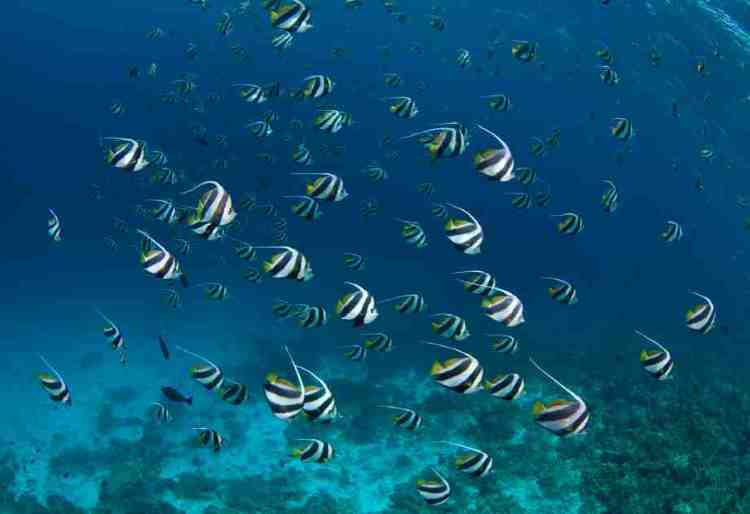
Spearos & underwater photographers beware: A snorkel that is too rigid, may wobble and scare off fish
- Decide whether you want to use a small float for your snorkel (optional): Some divers prefer tying their snorkels to a float on the surface, before diving down. This is often done to reduce drag when swimming. If your snorkel tube is small and soft enough, you shouldn’t feel any real drag when diving.
Should you keep your snorkel in your mouth when freediving?
Now at this point, you may be wondering at what stage you’re actually meant to remove the snorkel from your mouth during your dive…
Should it be done before the breathe-up?
After the breathe-up? Underwater? When you resurface?
Well, in almost all cases you want to remove your snorkel before you dive down underwater.
For those of you who breathe-up through a snorkel – that’s fine; just make sure you spit your snorkel out before descending. In some cases it can be deadly to freedive underwater with a snorkel in your mouth. This is especially true during deep dives. Why? Well, let’s explore the reasons below.
4 Reasons to remove your snorkel from your mouth when freediving
Reason #1:Your tongue is a weak barrier against water.
When you breath-hold dive underwater with a snorkel in your mouth, you typically use your tongue to seal the mouth piece. Your tongue essentially acts as a small barrier stopping the water inside your snorkel running through the mouth piece and into your lungs.
This isn’t very safe. If you were to get distracted by something like a dangerous animal hovering close by or feeling the effects of nitrogen narcosis…you could move or curl your tongue in reaction. And once you move your tongue away from the mouth piece, the flood gates open and water is able to rush straight into your mouth and lungs. This is not something you want to risk 60 feet underwater.
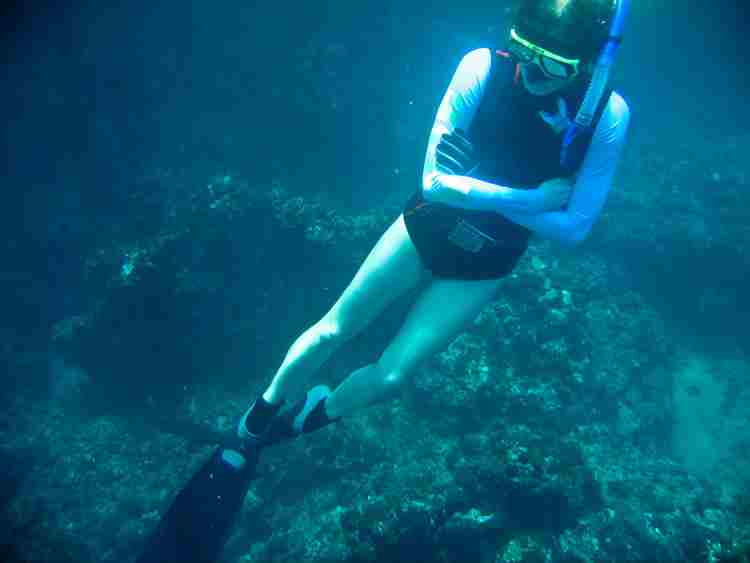
It’s safest to leave the snorkel out of your mouth when freediving
Reason #2: Freediving with a snorkel in your mouth boosts your chances of drowning.
Typically if you blackout or lose consciousness underwater, your body’s natural defense mechanism kicks in to prevent drowning. This defense mechanism shuts your jaw tightly as soon as you lose consciousness, so you don’t inhale water into your lungs.
But if you pass out with a snorkel in your mouth, your jaw will shut tightly around the mouthpiece. And because you’re unconscious, your tongue muscles guarding the end of the mouth piece will slacken. This will cause water to rush straight from the tube and into your lungs.
Reason #3: Resurfacing with a snorkel in your mouth can lead to blackouts.
When you’re resurfacing from a dive, gasping for air, the last thing you want to do is have to clear your snorkel before breathing in. In freediving, every second of oxygen deprivation counts. The mere seconds you spend on the surface trying to clear your snorkel before breathing in, could push you over the edge into blacking out.
It’s best to simply leave the snorkel out of your mouth, so when you resurface, you can breathe through your mouth straight away.
Reason #4: Not suitable for strong currents
Diving in strong currents with a snorkel in your mouth is a bad idea. At best, the extra drag from the current will push and pull your snorkel which is kind of annoying and will slow you down.
At worst; your entire mask and snorkel could be ripped off by the current. When this happens, you could inhale water out of shock and the entire situation becomes dangerous.
If you really must keep your snorkel in your mouth during the dive, at least make sure there are no strong currents.
Which freedivers should dive with a snorkel in their mouth?
Some spearos doing short, repetitive, shallow surface dives like to keep their snorkel in their mouth the entire time. That way, if they catch something, they can resurface, clear their snorkel and inhale, all the while keeping an eye on the fish underwater. This is especially useful if you’re wrestling with a tough fish trying to wiggle away off your spear.
About the Author Gerrie van Niekerk - Apnealogy
Gerrie is a passionate Freediver, Spearfisher, Digital Marketer, and author for the Apnealogy website. Gerrie is an SSI Level 1 certified Freediver who loves geeking out about freediving and spearfishing gear and lives for his family and adventure.


